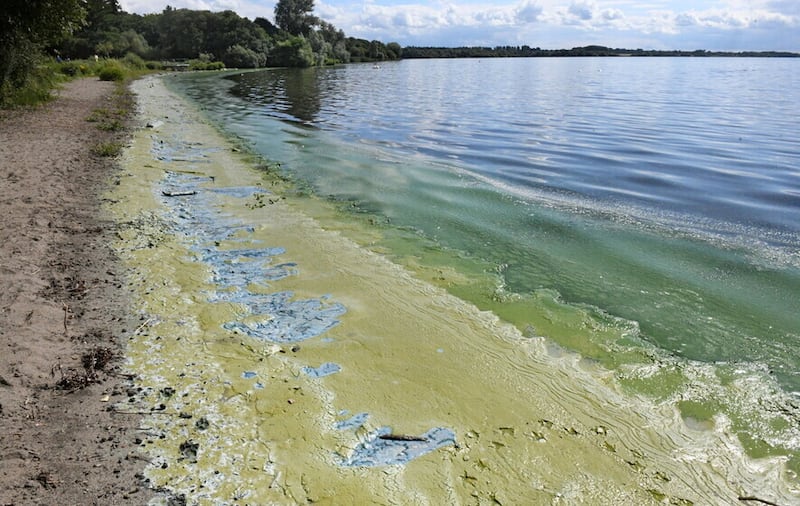Alliance minister Andrew Muir is not given to over-statement. He has told the assembly it is “disappointing” his Department of Agriculture, Environment and Rural Affairs (DAERA) has received only £1.6 million in capital funding and no day-to-day additional funding to address the crisis in Lough Neagh.
There was a blunter assessment from Dr John Barry, Professor of Green Political Economy at Queen’s University Belfast.
“It’s not even going to touch the sides,” he said.
That is certainly true in terms of the overall problem. Lough Neagh will take 40 years to recover, according to the department’s research institute, assuming work on tackling pollution begins now. Modernising the water and sewage system is by far the largest cost – an extra £150 million a year until 2040.
But NI Water is not Muir’s responsibility. It belongs to the Sinn Féin-controlled Department for Infrastructure. The largest source of pollution in Lough Neagh and all our watercourses is farming, which obviously is Muir’s department. Enforcing the rules against water pollution is also DAERA’s responsibility, via an agency under the department, the Northern Ireland Environment Agency (NIEA).
Better enforcement is at least as much an issue of will as of money. Although there are 26,000 farms in Northern Ireland, only 5,000 are large enough to require a full-time farmer. Not all produce or use the pollutants of most concern in Lough Neagh and only a fraction are misusing them. Not all the polluters need to be caught – they merely need to fear being caught.

Farmers are occasionally prosecuted by NIEA. It went to Dungannon magistrate’s court last year over a slurry spill that killed 4,000 fish along 9km of the River Torrent in Co Tyrone. However, this was a rare enforcement action in an exceptionally serious case – Muir described it as “regrettable”. The defendants received a conditional discharge and were ordered to pay NIEA’s investigation costs plus £6,290 in compensation. Such light and infrequent punishments are unlikely to deter ingrained behaviour across the agrifood industry.
It should cost little or nothing for a new minister to send a signal of intent. The first thing Muir could do would be to reverse a decision by his DUP predecessor, Edwin Poots. DAERA can levy a ‘fine’ on farmers who repeatedly break pollution rules by withholding part of their subsidy. In 2022, Poots cut the maximum fine from 100 per cent to 15 per cent.

Muir could also direct a change of culture within NIEA. Its strategic plans are full of blather about help, support and education for “stakeholders and those we regulate”, yet the rules on water pollution are simple to understand and meet. Slurry, the pollutant of most concern, cannot be spread between November and January, in wet weather, or beside a watercourse.
Rather than teaching these rules to farmers, who must know them already, NIEA should be advertising them to the public along with its phone line to report infractions (0800 807060). A campaign could be run to encourage reports, with a facility to submit mobile phone footage as evidence. NIEA could then select several miscreants, make an example of them, and recoup its costs through the courts. Why is this considered too aggressive to contemplate?
The 2016 merger of Stormont’s agriculture and environment departments created a ministry of poachers and gamekeepers, not that enforcement before 2016 was any better. The recent whistleblower scandal at DAERA, where a vet was forced out of her job for raising animal welfare concerns, reveals the extent to which the department is captured by farming interests. Muir is clearly approaching this with caution, a judgement that is still fair enough only a few months into his job.
Rather than teaching the rules to farmers, who must know them already, NIEA should be advertising them to the public along with its phone line to report infractions
International best practice is to have an environmental protection agency that is independent of government. Stormont has been debating this for years, it was promised in New Decade, New Approach, and the assembly approved an SDLP motion for it this week, with Muir’s full approval. However, unionists are opposed and can obstruct it at the executive, so more years of dithering lie ahead.

NIEA might not be perfect but we are stuck with it in the meantime. It should still be capable of delivering basic enforcement, even if its desks are not far enough away from the officials responsible for agriculture.
The lake supplying 40 per cent of our drinking water has died because an easily-identifiable handful of people cannot be bothered to lawfully handle their waste.
Why is anyone still tiptoeing around them?




